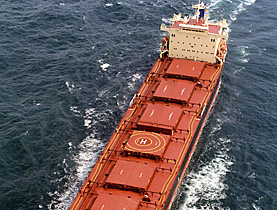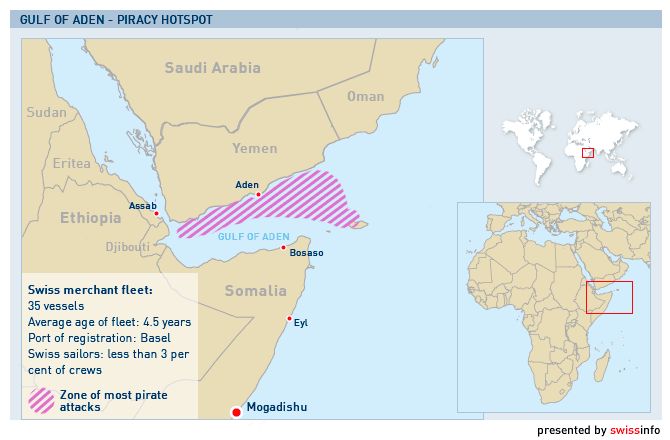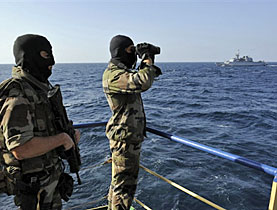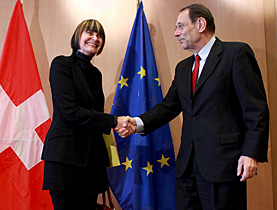Cabinet agrees to troops for anti-pirate force

The government has come out in favour of sending up to 30 staff for an armed anti-piracy mission by the European Union off the coast of Somalia.
The decision, which is subject to approval by parliament, has prompted opposition by the rightwing Swiss People’s Party and the Greens, but the three other main parties indicated their approval.
The mandate of the Swiss soldiers and experts is limited to the protection of vessels of the United Nations World Food Programme. It also includes the protection of the Swiss cargo ships crossing the Gulf of Aden, according to the foreign ministry.
“Engagement by Swiss soldiers in operation Atalanta must not exceed the mandate of a military police force. Military offensives against pirates at sea or on land are excluded,” the statement said.
It added that the Swiss contingent is part of the country’s humanitarian policy and seeks to defend Swiss interest.
The deployment includes elite troops, legal experts and a medical team as well as senior officers. It will cost about SFr9.8 million ($8.4 million). No time limit was indicated.
Wednesday’s move by the cabinet comes after two months of public debate. The government had previously discussed Swiss participation in operation Atalanta several times without taking a decision.
Talks in Brussels
Last week Foreign Minister Micheline Calmy-Rey travelled to Brussels for talks with the EU foreign policy chief, Javier Solana, to examine the conditions.
Solana made it clear that the EU would not accept a purely financial contribution. “Frankly speaking, such an option is not a priority,” he told journalists in Brussels.
Landlocked Switzerland is not a member of the EU and its neutral status is enshrined in the constitution. The country has a fleet of 35 privately operated tankers and container ships.
Around 30 per cent of Swiss-bound goods pass through the Gulf of Aden, one of the world’s busiest sea lanes.
Somali pirates have seized a number of foreign ships in recent months and demanded large ransoms for their release.
In December one Swiss vessel was pursued by pirates off the coast of Somalia.
Reaction
The Swiss parliament is likely to debate the government plans in one of the next regular sessions.
The centre-right Radicals and the Christian Democrats said the mandate was clear and Swiss elite soldiers were trained for missions abroad. The centre-left Social Democrats gave the government plan cautious approval.
The rightwing People’s Party on the other hand accused the government of undermining Swiss neutrality.
It will challenge a possible confirmation of the government proposal by forcing a nationwide vote, according to a party statement.
In a similar vein, the Campaign for an Independent and Neutral Switzerland described the Swiss move as “grotesque” and a “serious mistake”.
On the other side of the political spectrum, the New European Movement Switzerland welcomed the government proposal, saying it was a step towards integration into a European security and defence strategy.
swissinfo, Urs Geiser
Swiss participation in operation Atalanta could include sending troops on military vessels or cargo ships.
Other options are the deployment of experts to the operation headquarters in Northwood, Britain, or to bases in the Gulf region.
Switzerland has a fleet of 35 privately owned tankers and container ships.
Last year parliament approved a five-year, SFr500 million support package for the country’s merchant navy operators.
Officially based in Basel’s Rhine port, the navy was set up to ensure that goods would still enter Switzerland in the event of a crisis.
The first EU naval operation was launched in December to try and protect shipping around the Gulf of Aden.
The newly formed Atalanta mission is trying to quell attacks using up to six frigates and three military patrol aircraft from Britain, France, Germany and Greece.
The route through the Suez Canal and the Gulf of Aden is a major sea lane between Europe and Asia.
The UN also delivers food to the starving population in Somalia as part of international aid programmes.
The mandate of the multinational force, led by Britain, is limited to 12 months.


In compliance with the JTI standards
More: SWI swissinfo.ch certified by the Journalism Trust Initiative












You can find an overview of ongoing debates with our journalists here . Please join us!
If you want to start a conversation about a topic raised in this article or want to report factual errors, email us at english@swissinfo.ch.